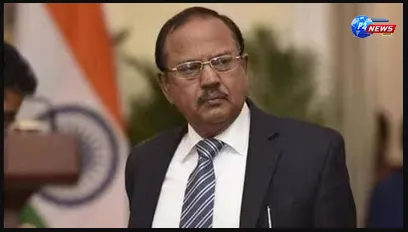Established in 2003, the Special Representatives mechanism aims to facilitate discussions and find a basis for resolving boundary disputes through structured negotiations and diplomatic engagement.
Established in 2003, the Special Representatives mechanism aims to facilitate discussions and find a basis for resolving boundary disputes through structured negotiations and diplomatic engagement.
In the near future, National Security Adviser Ajit Doval is set to travel to China to advance discussions about the enduring border conflict, which has persisted for years. This visit is anticipated to follow the disengagement of military forces along the Line of Actual Control (LAC), as indicated by sources familiar with the developments.
Ajit Doval's most recent interaction with Chinese Foreign Minister Wang Yi occurred in September. Currently, efforts are underway to finalize the dates for this critical visit. It is projected that the NSA may reach Beijing for discussions related to the Special Representatives mechanism concerning the border issue either by the end of this year or in early January, as per sources who requested anonymity due to the sensitive nature of the discussions.
The Special Representatives mechanism has Doval paired with Wang Yi, his counterpart from China. Their last encounter took place during a multilateral meeting in St. Petersburg, Russia, on September 12. During that meeting, both sides were actively engaged in establishing the groundwork that would ultimately lead to the understanding achieved on October 21 regarding the disengagement of frontline troops at the two contentious locations of Demchok and Depsang.
This forthcoming meeting involving the Special Representatives will succeed various high-level discussions that occurred recently. Prime Minister Narendra Modi and Chinese President Xi Jinping engaged in dialogue on the sidelines of the Brics Summit held in Kazan on October 23. Following that, External Affairs Minister S. Jaishankar held talks with Wang Yi during the G20 Summit in Rio de Janeiro on November 18, and Defence Minister Rajnath Singh met with Chinese Defence Minister Dong Jun during the Asean Defence Ministers-Plus gathering in Vientiane on November 20.
Modi and Xi made a joint decision during their discussions to revitalize several diplomatic mechanisms, including the meetings of Special Representatives, with the goal of resolving the border situation and restoring normal bilateral relations. Subsequently, the Working Mechanism for Consultation and Coordination (WMCC) on India-China border affairs convened in New Delhi on December 5, agreeing to uphold peace and stability along the disputed border in accordance with existing bilateral accords and protocols.
Established in 2003, the Special Representatives mechanism was designed to investigate potential frameworks for a boundary settlement. Over the years, this initiative has seen 22 formal rounds of discussions, with the last round taking place in 2019. Throughout the military standoff that initiated in April-May 2020, the Special Representatives engaged in multiple rounds of negotiations aimed at de-escalating the tensions.
This standoff, which included a violent clash in Galwan Valley in June 2020 that resulted in the loss of 20 Indian soldiers and at least four Chinese personnel, brought bilateral relations to a significant low, reminiscent of the tensions experienced during the border war in 1962. Moving forward, these upcoming talks represent a crucial opportunity to rebuild and fortify the relationship between India and China, addressing lingering issues while fostering a more collaborative environment.
Like
Dislike
Love
Angry
Sad
Funny
Pray
'Trump Tracker: Tulsi Gabbard's Surprising Appointment as US Intelligence Chief
November 14, 20249th Ayurveda Day in Melbourne: A Celebration of Ayurvedic Innovations and Global Health Impact
November 10, 2024🍪 We Value Your Privacy and Experience Hi there! We use cookies to enhance your browsing experience, provide personalized content, and analyze site traffic. By continuing to use our site, you consent to our use of cookies.







Comments 0